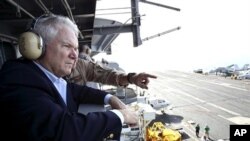During a visit to Afghanistan, U.S. Defense Secretary Robert Gates said U.S. troops in some areas are in a "tough fight," and any progress must be measured at a very local level. His top commander in Afghanistan, General David Petraeus, said the Taliban still has the momentum in some areas, but that allied progress is beginning to have a broader, psychological impact.
Secretary Gates flew into Eastern Afghanistan, not far from the Pakistani border, and told reporters he found U.S., allied and Afghan troops there in a tough fight.
"I think these guys being close to the border do face some special challenges, and have taken some serious losses," Gates said. "There is no question, being here close to the border, that they are in a tough fight."
Secretary Gates said there is "selective" good news, with "real headway" in security and governance in some areas. But he said in Afghanistan, it is difficult to generalize.
"The lesson learned here is that you should not generalize about Afghanistan," Gates said. "You should not even generalize from regional command to regional command or province to province, that you really have to take it a district at a time, and maybe even more local areas than that, and diversify your strategy depending on the local conditions in terms of whether [U.S. troop] presence contributes to security or detracts from security. And that may differ from one valley to the next."
With the surge of international forces in place for several months now, and President Barack Obama's deadline for beginning a drawdown just eight months away, U.S. commanders are fielding questions about whether their areas are ready for a reduction of forces. Speaking to reporters Tuesday, General Petraeus repeated his view that allied and Afghan forces have seized momentum in most parts of the country, but not all.
"Clearly, again, the Taliban does have still areas in which it has the freedom of movement, in some cases still has arguably the momentum, and so therefore there's more work to be done in those areas," Petraeus said.
Also Tuesday, the U.S. commander in Southwestern Afghanistan, including volatile Helmand Province, told reporters he is seeing enough progress to at least contemplate reducing his troop numbers in some areas, but not in the region as a whole. Major General Richard Mills spoke via satellite with reporters at the Pentagon.
"I can say that I think that the situation on the ground will allow me to make some readjustments within my force as to where I apply my efforts, and where I apply my main force, and where I have people on the ground over the course of the next few months," Mills said.
But General Petraeus said local progress in key areas is more significant than it might appear.
"The progress of recent months in particular has been important, both on the ground and, I think even in a sense, psychologically because it has demonstrated we could, and 'we' now meaning ISAF and Afghan forces together, could indeed take away very important areas, areas that mean a great deal to the Taliban," Petraeus said.
Still, in an interview with ABC News this week, Petraeus declined to express confidence that the allied and Afghan effort will succeed by 2014 - the target date Afghan and NATO leaders have set for transferring security authority to Afghanistan. Petraeus is now participating in President Obama's promised December Afghanistan strategy review, designed to identify any needed adjustments. But officials say they do not expect major changes in the only one-year-old plan.
Petraeus said the new emphasis on the hoped-for end of major allied involvement in 2014, rather than on the planned beginning of the drawdown next year, is already having a positive impact. He said local Afghan leaders have told him they are more confident of continued foreign help than they were before.




